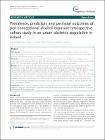| dc.contributor.author | MURPHY, DEIRDRE | |
| dc.contributor.author | MULLALLY, AOIFE | |
| dc.contributor.author | BARRY, JOSEPH | |
| dc.date.accessioned | 2011-05-11T15:12:27Z | |
| dc.date.available | 2011-05-11T15:12:27Z | |
| dc.date.issued | 2011 | |
| dc.date.submitted | 2011 | en |
| dc.identifier.citation | Aoife Mullally, Brian J Cleary, Joe Barry, Tom P Fahey and Deirdre J Murphy, Prevalence, predictors and perinatal outcomes of peri-conceptional alcohol exposure-retrospective cohort study in an urban obstetric population in Ireland, BMC Pregnancy and Childbirth, 11, 27, 2011 | en |
| dc.identifier.other | Y | |
| dc.identifier.uri | http://hdl.handle.net/2262/55468 | |
| dc.description | PUBLISHED | en |
| dc.description.abstract | Background: Evidence-based advice on alcohol consumption is required for pregnant women and women
planning a pregnancy. Our aim was to investigate the prevalence, predictors and perinatal outcomes associated
with peri-conceptional alcohol consumption.
Methods: A cohort study of 61,241 women who booked for antenatal care and delivered in a large urban
maternity hospital between 2000 and 2007. Self-reported alcohol consumption at the booking visit was categorised
as low (0-5 units per week), moderate (6-20 units per week) and high (>20 units per week).
Results: Of the 81% of women who reported alcohol consumption during the peri-conceptional period, 71%
reported low intake, 9.9% moderate intake and 0.2% high intake. Factors associated with moderate alcohol
consumption included being in employment OR 4.47 (95% CI 4.17 to 4.80), Irish nationality OR 16.5 (95% CI 14.9 to
18.3), private health care OR 5.83 (95% CI 5.38 to 6.31) and smoking OR 1.86 (95% CI 1.73 to 2.01). Factors
associated with high consumption included maternal age less than 25 years OR 2.70 (95% CI 1.86 to 3.91) and illicit
drug use OR 6.46 (95% CI 3.32 to 12.60). High consumption was associated with very preterm birth (<32 weeks
gestation) even after controlling for socio-demographic factors, adjusted OR 3.15 (95% CI 1.26-7.88). Only three
cases of Fetal Alcohol Syndrome were recorded (0.05 per 1000 total births), one each in the low, moderate and
high consumption groups.
Conclusions: Public Health campaigns need to emphasise the importance of peri-conceptional health and prepregnancy planning. Fetal Alcohol Syndrome is likely to be under-reported despite the high prevalence of alcohol
consumption in this population. | en |
| dc.language.iso | en | en |
| dc.relation.ispartofseries | BMC Pregnancy and Childbirth; | |
| dc.relation.ispartofseries | 11; | |
| dc.relation.ispartofseries | 27; | |
| dc.rights | Y | en |
| dc.subject | Public Health | en |
| dc.subject | pregnancy | en |
| dc.subject | peri-conceptional alcohol consumption | en |
| dc.title | Prevalence, predictors and perinatal outcomes of peri-conceptional alcohol exposure-retrospective cohort study in an urban obstetric population in Ireland | en |
| dc.type | Journal Article | en |
| dc.type.supercollection | scholarly_publications | en |
| dc.type.supercollection | refereed_publications | en |
| dc.identifier.peoplefinderurl | http://people.tcd.ie/joebarry | |
| dc.identifier.peoplefinderurl | http://people.tcd.ie/murphyd4 | |
| dc.identifier.peoplefinderurl | http://people.tcd.ie/amullall | |
| dc.identifier.rssinternalid | 73264 | |
| dc.identifier.rssuri | http://dx.doi.org/10.1186/1471-2393-11-27 | en |




